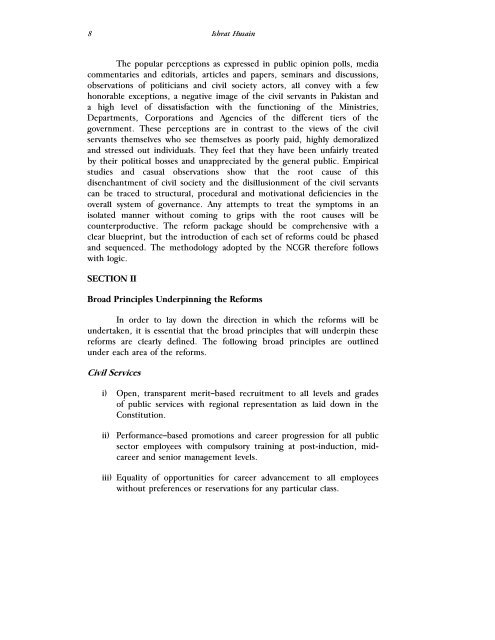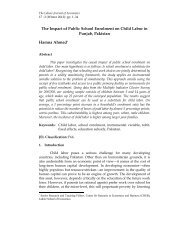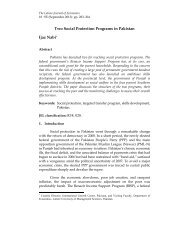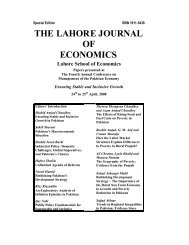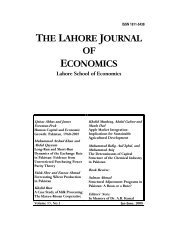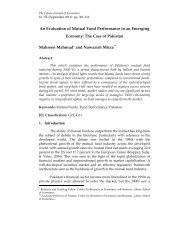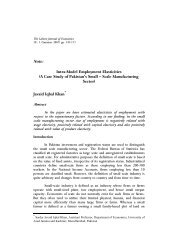- Page 1: Special Edition ISSN 1811-5438 THE
- Page 5: THE LAHORE JOURNAL OF ECONOMICS Con
- Page 8 and 9: Monetary, Fiscal and Financial Sect
- Page 11 and 12: The Lahore Journal of Economics Spe
- Page 13 and 14: Reforming the Government in Pakista
- Page 15 and 16: Reforming the Government in Pakista
- Page 17: Reforming the Government in Pakista
- Page 21 and 22: Reforming the Government in Pakista
- Page 23 and 24: Reforming the Government in Pakista
- Page 25: Reforming the Government in Pakista
- Page 28 and 29: 18 A. R. Kemal export product would
- Page 30 and 31: 20 A. R. Kemal three indicators, Pa
- Page 32 and 33: 22 A. R. Kemal Rank Score Efficienc
- Page 34 and 35: 24 A. R. Kemal while productivity g
- Page 36 and 37: 26 A. R. Kemal across the globe whi
- Page 38 and 39: 28 A. R. Kemal V. Conclusions Pakis
- Page 41 and 42: The Lahore Journal of Economics Spe
- Page 43 and 44: Increasing Global Competitiveness:
- Page 45 and 46: Increasing Global Competitiveness:
- Page 47 and 48: Increasing Global Competitiveness:
- Page 49 and 50: Increasing Global Competitiveness:
- Page 51 and 52: Increasing Global Competitiveness:
- Page 53 and 54: The Lahore Journal of Economics Spe
- Page 55 and 56: Monetary and Fiscal Policies 45 sys
- Page 57 and 58: Monetary and Fiscal Policies 47 200
- Page 59 and 60: Monetary and Fiscal Policies 49 (es
- Page 61 and 62: Monetary and Fiscal Policies 51 The
- Page 63 and 64: Monetary and Fiscal Policies 53 The
- Page 65 and 66: Monetary and Fiscal Policies 55 Thi
- Page 67 and 68: Monetary and Fiscal Policies 57 Whi
- Page 69 and 70:
Monetary and Fiscal Policies 59 exc
- Page 71 and 72:
Monetary and Fiscal Policies 61 mat
- Page 73 and 74:
Monetary and Fiscal Policies 63 Tax
- Page 75:
Monetary and Fiscal Policies 65 Ref
- Page 78 and 79:
68 Shakil Faruqi Currently, the fin
- Page 80 and 81:
70 Shakil Faruqi crises, or both. T
- Page 82 and 83:
72 Shakil Faruqi system. The crowdi
- Page 84 and 85:
74 Shakil Faruqi The financial stre
- Page 86 and 87:
76 Shakil Faruqi taking activities
- Page 88 and 89:
78 Shakil Faruqi In spite of attent
- Page 90 and 91:
80 Shakil Faruqi change of this mag
- Page 92 and 93:
82 Shakil Faruqi position which beg
- Page 94 and 95:
84 Shakil Faruqi became insolvent a
- Page 96 and 97:
86 Shakil Faruqi 2009, the CAR for
- Page 98 and 99:
88 Shakil Faruqi ratio of net inter
- Page 100 and 101:
90 Shakil Faruqi risk has to be man
- Page 102 and 103:
92 Shakil Faruqi through a few roun
- Page 104 and 105:
94 Shakil Faruqi Crockett, Andrew:
- Page 106 and 107:
96 Shakil Faruqi State Bank of Paki
- Page 108 and 109:
98 Muhammad Arshad Khan and Sajawal
- Page 110 and 111:
100 Muhammad Arshad Khan and Sajawa
- Page 112 and 113:
102 Muhammad Arshad Khan and Sajawa
- Page 114 and 115:
104 Muhammad Arshad Khan and Sajawa
- Page 116 and 117:
106 Muhammad Arshad Khan and Sajawa
- Page 118 and 119:
108 Muhammad Arshad Khan and Sajawa
- Page 120 and 121:
110 Muhammad Arshad Khan and Sajawa
- Page 122 and 123:
112 Muhammad Arshad Khan and Sajawa
- Page 124 and 125:
114 Muhammad Arshad Khan and Sajawa
- Page 126 and 127:
116 Muhammad Arshad Khan and Sajawa
- Page 128 and 129:
118 Muhammad Arshad Khan and Sajawa
- Page 130 and 131:
120 Muhammad Arshad Khan and Sajawa
- Page 132 and 133:
122 Muhammad Arshad Khan and Sajawa
- Page 134 and 135:
124 Muhammad Arshad Khan and Sajawa
- Page 137 and 138:
The Lahore Journal of Economics Spe
- Page 139 and 140:
Pakistan’s External Trade: Does E
- Page 141 and 142:
Pakistan’s External Trade: Does E
- Page 143 and 144:
Pakistan’s External Trade: Does E
- Page 145 and 146:
Pakistan’s External Trade: Does E
- Page 147 and 148:
Pakistan’s External Trade: Does E
- Page 149 and 150:
Pakistan’s External Trade: Does E
- Page 151 and 152:
Pakistan’s External Trade: Does E
- Page 153 and 154:
Pakistan’s External Trade: Does E
- Page 155 and 156:
Pakistan’s External Trade: Does E
- Page 157 and 158:
Pakistan’s External Trade: Does E
- Page 159 and 160:
Pakistan’s External Trade: Does E
- Page 161 and 162:
Pakistan’s External Trade: Does E
- Page 163 and 164:
Pakistan’s External Trade: Does E
- Page 165 and 166:
The Lahore Journal of Economics Spe
- Page 167 and 168:
Implications for Economic Reforms i
- Page 169 and 170:
Implications for Economic Reforms i
- Page 171 and 172:
Implications for Economic Reforms i
- Page 173 and 174:
Implications for Economic Reforms i
- Page 175 and 176:
Implications for Economic Reforms i
- Page 177 and 178:
Implications for Economic Reforms i
- Page 179 and 180:
Implications for Economic Reforms i
- Page 181 and 182:
Implications for Economic Reforms i
- Page 183 and 184:
Implications for Economic Reforms i
- Page 185 and 186:
The Lahore Journal of Economics Spe
- Page 187 and 188:
Economic Effects of the Recently Si
- Page 189 and 190:
Economic Effects of the Recently Si
- Page 191 and 192:
Economic Effects of the Recently Si
- Page 193 and 194:
Economic Effects of the Recently Si
- Page 195 and 196:
Economic Effects of the Recently Si
- Page 197 and 198:
Economic Effects of the Recently Si
- Page 199 and 200:
Economic Effects of the Recently Si
- Page 201 and 202:
Economic Effects of the Recently Si
- Page 203 and 204:
Economic Effects of the Recently Si
- Page 205 and 206:
Economic Effects of the Recently Si
- Page 207 and 208:
Economic Effects of the Recently Si
- Page 209 and 210:
Economic Effects of the Recently Si
- Page 211 and 212:
Economic Effects of the Recently Si
- Page 213 and 214:
Economic Effects of the Recently Si
- Page 215 and 216:
The Lahore Journal of Economics Spe
- Page 217 and 218:
Determinants of Female Labor Force
- Page 219 and 220:
Determinants of Female Labor Force
- Page 221 and 222:
Determinants of Female Labor Force
- Page 223 and 224:
Determinants of Female Labor Force
- Page 225 and 226:
Determinants of Female Labor Force
- Page 227 and 228:
Determinants of Female Labor Force
- Page 229 and 230:
Determinants of Female Labor Force
- Page 231 and 232:
Determinants of Female Labor Force
- Page 233 and 234:
Determinants of Female Labor Force
- Page 235 and 236:
Determinants of Female Labor Force
- Page 237 and 238:
Determinants of Female Labor Force
- Page 239 and 240:
Determinants of Female Labor Force
- Page 241 and 242:
Determinants of Female Labor Force
- Page 243 and 244:
Determinants of Female Labor Force
- Page 245 and 246:
Determinants of Female Labor Force
- Page 247 and 248:
Determinants of Female Labor Force
- Page 249 and 250:
11. All references used in the text
- Page 252:
The Lahore School of Economics The


